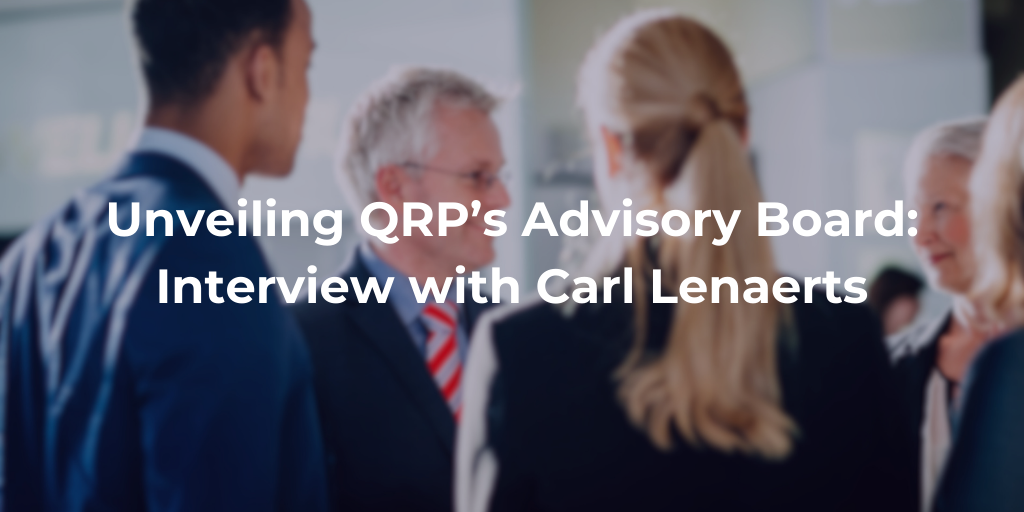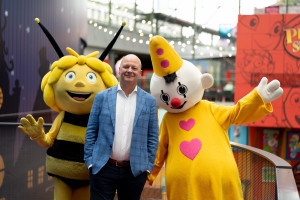At the heart of any successful company is a robust understanding of market opportunities and management best practices. That is why, in September 2023 QRP decided to implement an Advisory Board in order to support the development of the activities of the company. This board is composed of Carl Lenaerts, Guy Ballantine and Andrea Franco.
In order to meet the Advisory board, we had interviews to get to know them better. In today’s interview we meet Carl Lenaerts, the CEO of the Plopsa Group. Carl gives us an interesting insight into the relationship he has with his team in order to be effective in any project
Could you give us a brief summary of your work experiences? What are you currently doing in your work?
My professional career can be divided into three big blocks. After my studies in international economics and my two-year stay in Sicily, I came back to Belgium to work for one of the biggest Belgian banks. I worked there from 1994 to 2009, so almost 15 years! I ended my career there as a MidCorp and a corporate banker. Then, after the financial crisis, I made the step to a cinema chain called Kinepolis, which is one of the biggest European players. I was the country operation manager until 2022. After an 18-month-experience at Standaard Boekhandel, the biggest Belgian chain in book retail, I became the CEO of Plopsa. It is one of the leading family theme parks in Europe including Aqua parks, indoor parks, hotels and villas. We have everything to enjoy a very nice and relaxing moment with friends and family.
How did you discover QRP and why did you choose this challenge to join the advisory board of this company?
I am probably one of the board that has known QRP for quite a long time. Maarten Dauwe, who is currently the Business Development Manager for QRP Belgium, worked as one of my employees in the bank. One day, he came to me and said that he was going to move to Milan to join QRP, which he described at that time as a little company that gives training and certifications in project management. So I know QRP not in a professional way but thanks to my relationship with Maarten. He is also the one who told Jacobus Groot, the CEO of QRP, when he decided to set up an advisory board for the company that he knew somebody who had the necessary competences and might be interested in joining the team. Thus, Jacobus called me and proposed for me to join the advisory board.
As you know QRP is specialised in project management certification and courses. In your daily work, do you use an approach to project management?
We have to make the distinction between our daily businesses in leisure parks and our investment projects. We make a lot of investments and for this purpose not only me as a CEO but my team, which is composed of architects, designers and engineers, know how to set up a project. Most of the time they work on a project over several months or even years. So this means that a certain approach of project management is needed to keep all these projects on time and within budget. Project management also help us to know which are the milestones and outcomes delivered by one.
In the specific leisure industry in which you work, what are the specificities and maybe the particular roadblocks that you can find that may be different from other industries?
The leisure industry depends on a lot of big investments, so we need to start early to develop a clear project. We always start from a kind of master plan for which we begin with the creation of our art director who draws a very high level kind of atmosphere. From his drawings the creative team makes what we call a “translation” from that idea. They add more details to obtain a technical drawing. The final step is made by an attraction builder and by our own architects. Once everything is settled and we are sure about the budget and the timing, we develop a normal building plan to set up all these things one by one.
In your work experiences, what was the most interesting project you worked on?
At Plopsa initially I was responsible for Belgium and Luxembourg, after which I started with the expansion of the company to the Netherlands. We started to buy small single houses and also to build brim fields. That was my first real estate experience in how to set up a project and I was able to adapt and take inspiration from my previous experience in cinema. Even though, at Plopsa it is more of a building process with a lot of inputs. So I learned how to operate in a pragmatic way and how to work with project management in a leading function. Project management is a practice which is really useful now in the Theme Park industry. But honestly, in this industry, the fact that all the parties involved need to be coordinated makes the work even more difficult. For example, when you are building a roller coaster safety is the number one priority. In the leisure industry there is no room for mistakes, you can not take risks as in the cinema industry.
Do you believe that having a certification in project management, having this technical knowledge before putting it into practice would have been useful for your colleagues and yourself? And do you feel like it is something that is an advantage in a CV?
I think it really can be an advantage for two reasons. First, when you follow a course to become PRINCE2 certified, you start working in a very structured way. So I think these methodologies force you to work in a structured way and that is something very important. Secondly, certified project managers share the same knowledge of project management and also speak the same language. I am not talking about Italian, English or French but I am referring to speaking the same technical language of project management, that makes it easier to have a discussion. It is also easier for the company: for example, if the project manager has to leave one project to work on another project, the company can replace him or her with somebody else. If they know the same tools and have the samw insights of project management, this will be much easier. So I really believe in a kind of structural way of project management.
I think that encouraging professional development is very important. As the CEO of Plopsa, I am working with a team of directors on a lot of challenges and strategic plans. The main pillars we have in the company are learning and development.
We know that there are not only technical skills that a good project manager needs to have: do you believe that project managers should have any specific soft skills?
I think the most important soft skills that a project manager must have is to be a team player. This does not apply only for project managers but for all experts in very specific and technical jobs. It is not always that easy to be part of a team. The major mistake made is what I call the “common language error”. For example, when I talk to a person who is an expert in ICT (Information Commuunication Technology), sometimes it is difficult for me to understand him or her. So he or she has to explain difficult concepts in a way my colleagues and I can understand. Being part of a team is to be able to explain something difficult in a simple way. It is a necessary skill in this world.
From your experience, which advice would you give to a person who is starting his or her career as a project manager?
Since the beginning of my career I have had this habit of taking off my jacket and rolling up my sleeves when I arrive at work. Why? Because that gesture means to me “okay, let’s get to work”. So, it gives a feeling of being open for the work and for the people. What is also important is to try to understand what the people are doing in the business. This mindset has brought me concrete results.
Let’s take an example. My first day in the team, I was not sitting at my desk during meetings, I was directly on the floor. Even nowadyas, many years later, I still spend lots of time on the floor to understand the business. It helps me to understand people. It is very important. The closer you are with your ground floor, the easier it is for them to explain to you why they are doing things in a specific manner. It allows you to have a more open discussion with them. Because once again, you start speaking the same language as they speak. Be humble and listen to the people because it is always better to do a lot of listening than do a lot of talking. In fact, when you talk you are not listening to the other person. You can never have too much information, but then you need to apply this knowledge and make the right decisions. For me, it is also being open in a practical way. When I am not in a meeting in my office, the door to my office is always open: if people just want to drink a coffee with me, I will make time for that. All I say to them is “great, I am finishing my mail but come back in five minutes and we can have a chat”. Even if there is no agenda, even if there are no meeting requests. Being open means to be open every single time for them.
If you want to know more the role of a Project Manager or about the PRINCE2 certification, read our blog post about “What is a project manager?” and “What is PRINCE2?“.








